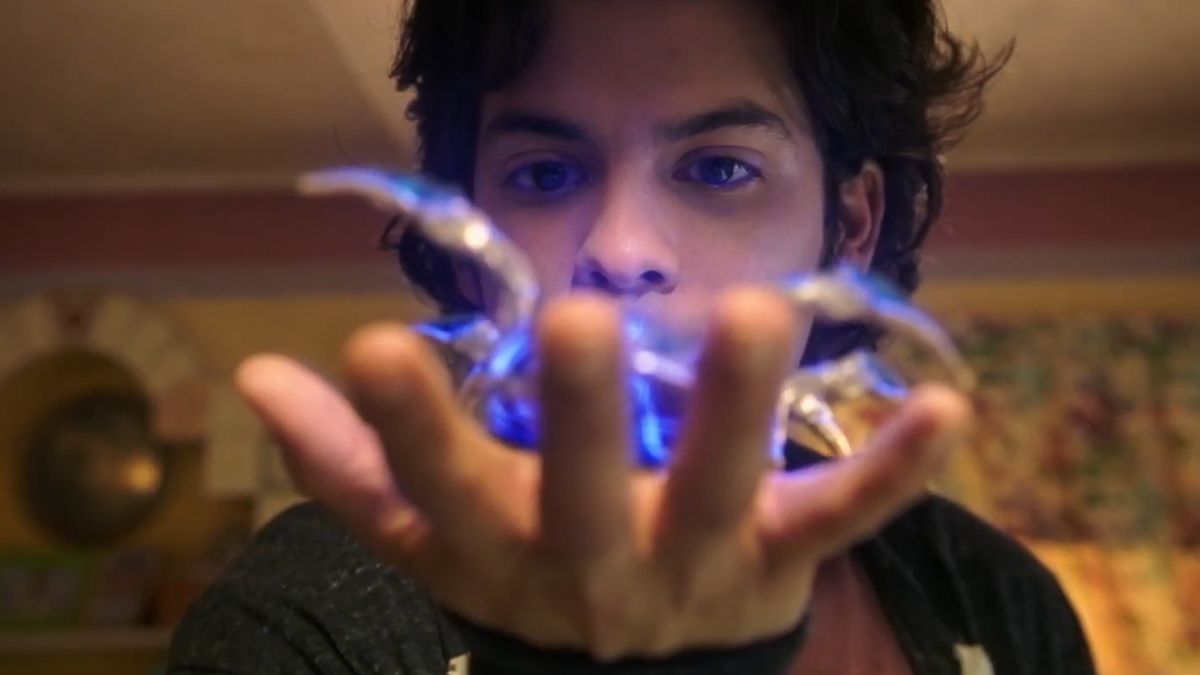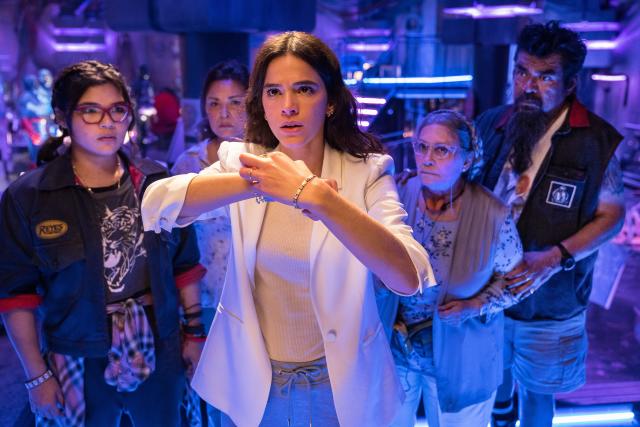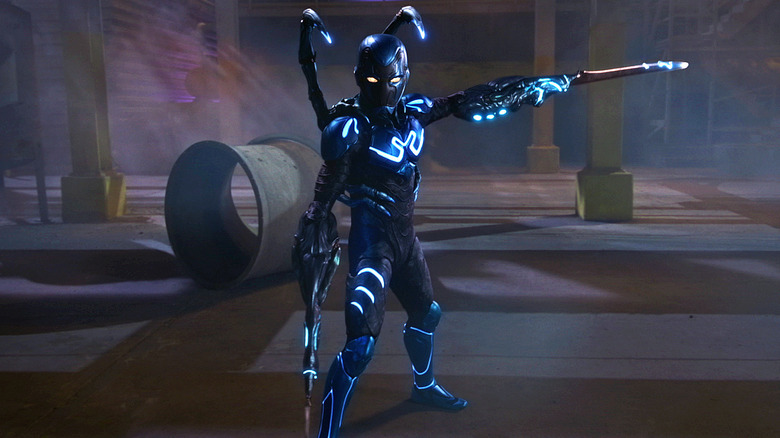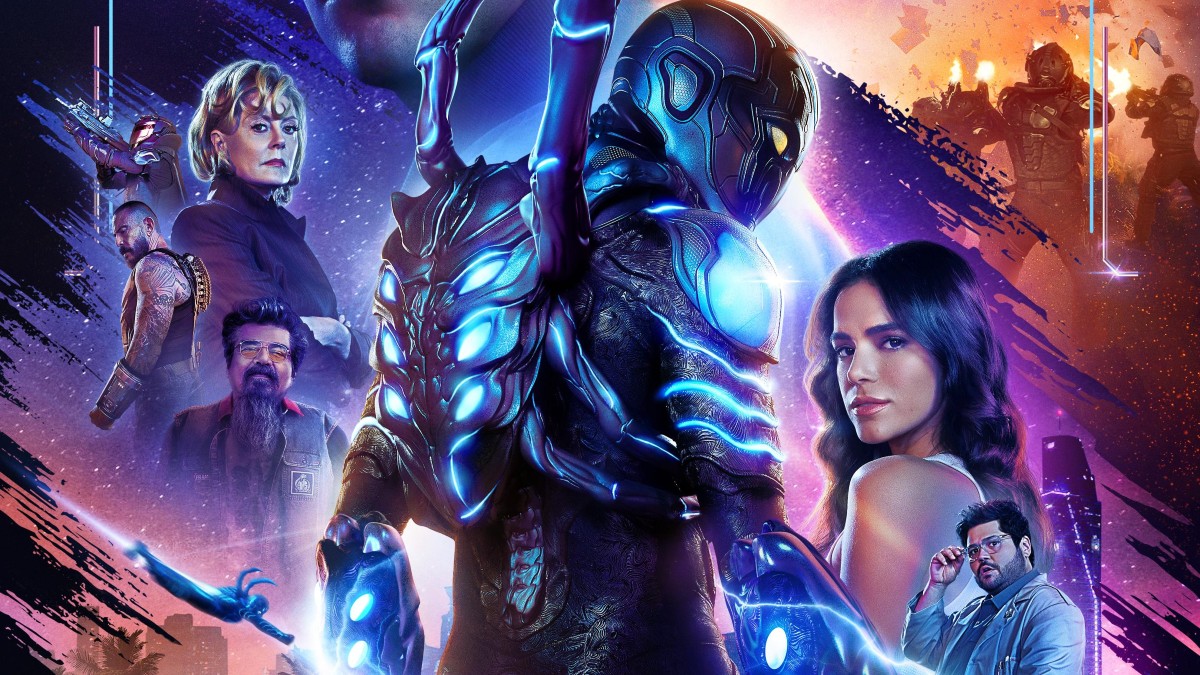Following the overdue release of this past Summer’s The Flash movie, the DC Extended Universe is officially no more… Mostly.
Despite James Gunn’s and Peter Safran’s new ‘DCU’ shared cinematic universe being primed and ready to go in the wake of The Flash’s events, there’s still the matter of a couple of DCEU holdover movies that were well into production at the time of the DCU’s announcement, and the subsequent formation of Gunn’s and Safran’s new production outfit, DC Studios. One of these planned DCEU movies, Batgirl, formerly planned to release straight-to-streaming on Max, was infamously cancelled by Warner Bros. Discovery’s new post-merger management, despite having wrapped filming. The other planned straight-to-Max DCEU movie, Blue Beetle was allowed to complete production and see release however, complete with an upgrade to a theatrical premiere! This just leaves long-in-development Aquaman sequel, Aquaman and the Lost Kingdom to follow, scheduled to hit theatres this December, before the DCU’s big screen offerings begin in earnest with the premiere of Superman: Legacy in July, 2025.
Blue Beetle getting a shot at theatrical success was a big deal for the little Latino-fronted superhero movie that could. Originally sounding like one of the more exciting straight-to-Max DCEU movies, before that initiative was quickly abandoned by Discovery’s higher-ups after the merger, Blue Beetle aspired to be a watershed superhero movie release for Latin American audiences, much like Black Panther was for Black/African audiences, and Shang-Chi and the Legend of the Ten Rings was for Asian audiences. Those two movies also had the strength of the Marvel Studios branding behind them however. Blue Beetle, meanwhile, is a holdover DCEU movie that’s hobbling out of a scrapped shared universe, one more or less on life support for the rest of this year, and ostensibly already erased from continuity after The Flash released in theatres last June.

The result? Blue Beetle is yet another box office bomb for DC, somehow tanking even harder than The Flash did, and thus casting a surprising amount of doubt on the potential box office fortunes, or lack thereof, that Aquaman and the Lost Kingdom could possibly accrue this Winter. Granted, Blue Beetle at least has the defense of not being originally meant to be released in theatres however, with audiences seemingly painfully aware that the movie is being shunted out simply because it’s finished, and not because it’s a meaningful addition to DC’s rebooted cinematic universe. That point is important to note as well, since, as confirmed by Gunn and Safran, Blue Beetle’s events are canon within the rebooted DCU, despite the movie originally being made for the now-aborted DCEU continuity. The fact that Blue Beetle is technically the very first movie to take place within the brand new DCU canon doesn’t mean much when it was virtually seen by no one though. The biggest shame there? Blue Beetle is a pretty good movie too!
Sure, it’s not Black Panther good, and even Shang-Chi and the Legend of the Ten Rings pretty firmly outclasses it. Even so, Blue Beetle presents a colourful, genuinely lovable romp that delivers a fairly conservative, but generally more reliable mix of superhero themes, humour, action and spectacle in contrast to The Flash before it. This is despite the movie most definitely being a side chapter that has no meaningful bearing on the wider DCU, and nor would it have carried much weight even in the old DCEU continuity either. Even so, if you still haven’t tired of good, old-fashioned superhero fun, Blue Beetle surprisingly stands as DC’s strongest movie of 2023 at this point, despite being fronted by the least-known superhero.
Blue Beetle’s big attempt to stand apart from the competition comes by way of it focusing around a family dynamic, in a much more literal sense. Whereas many superhero movies deal with themes of found families, a formula first minted and perfected by Marvel Studios’ Avengers movies, Blue Beetle deals with a very literal blood-related family, one struggling within the slums of all-new fictional locale, Palmera City. After the Reyes family’s young son, Jaime, played by Cobra Kai’s Xolo Mariduena, returns home to Palmera City in order to look for a job, a series of fortunate (or unfortunate) events thrusts Jaime into the feuding dysfunction of the very rich, very powerful Kord family, one that heads up Palmera City’s biggest local conglomerate, Kord Industries.
One thing leads to another, and Jaime ends up becoming the unwilling victim of Kord’s dirty secret; A mysterious ‘Scarab’ that permanently bonds to its chosen host, and whose technology has been repeatedly reverse-engineered to make some of Kord’s finest inventions. Now aggressively targeted by the bad guys, and with his family bearing witness to his horrific bonding to the Scarab, Jaime must find a way to try and get the bug to abandon him, though obviously, this seemingly traumatic event instead ends up transforming him into a powerful superhero.
Like I said, Blue Beetle’s story beats are pretty conservative for a superhero origin movie by this point. The movie feels like an almost exact blend between Marvel Studios’ Iron Man and Ant-Man movies, with a few recognizable plot lifts from Sony’s Spider-Man movies on top of that. Jaime being desperate to ‘cure’ himself of his new powers is also a story element that’s been featured to some degree in everything from 20th Century Studios’ Fantastic Four movies to Sony’s Venom movies to Universal’s Hulk movies. These are tropes that superhero movies have explored to painstaking length, leaving Blue Beetle’s origin story to feel disappointingly trite in terms of its circumstances and threats.
“Perhaps Blue Beetle is a testament to superhero movies still thriving when they’re backed by likable and fun lead characters though, even if everything around them isn’t really doing much to stand out.”
Fortunately, the Reyes family does a lot of heavy lifting here, to compensate. It’s thanks to the very likable, highly relatable Reyes brood that Blue Beetle manages to work as well as it does, despite the fact that Jaime’s heroic origin isn’t really doing much that audiences haven’t seen before. Jaime himself is a very energetic, charming underdog lead that Mariduena excellently brings to life though, one ultimately at the mercy of the Scarab and its guardian entity, Khaji-Da, voiced by singer, Becky G. Between well-meaning, if overwhelmed parents, a non-English-speaking, yet incredibly resourceful grandmother, and Jaime’s smart-mouthed sister, there’s a lot of heart and humour shared between the Reyes clan before Jaime even gets his powers, let alone after. The predictable highlight among this on-screen family has to be George Lopez though, as Jaime’s weird, paranoid Uncle Rudy, a man who is utterly convinced that Kord and the government are watching his every move, and that’s before his nephew becomes a genuinely hunted superhero!
The Reyes family existing in a lower-class, struggling slum home is also a fairly interesting contrast when paired with the DC-approved, uber rich superhero-dealing corporation in Kord Industries. That’s another trope that isn’t exactly unfamiliar in superhero media, with the DC Universe in particular dealing with plenty of these rich corporate factions. There’s barely anything separating Kord Industries from being a blatant knock-off of Wayne Enterprises, Lexcorp, Queen Industries, or whichever other uber rich, superhero-themed DC corporation you care to name. Hell, it may not surprise you that Kord is probably a literal knock-off of those DC factions, since Blue Beetle was a character originally created by the now-defunct Fox Comics, and later revamped with a new personality by Charlton Comics, before later being acquired by DC after Charlton’s shuttering. So, in a familiar twist, Kord’s inevitable connection with the comic book industry’s Blue Beetle line (Jaime Reyes is the third Blue Beetle, after all, invented wholesale by DC after they acquired the related characters, with the former two Blue Beetles, Dan Garrett and Ted Kord, preceding DC’s ownership), is acknowledged openly during Blue Beetle’s events, a genuinely cool bit of fan service, though it would have been ideal if this trick hadn’t already been done in Marvel’s Ant-Man movies.
As I mentioned however, even if Blue Beetle isn’t a very novel movie, it’s still fun and action-packed enough to delight established fans of superheroes, and particularly those who already enjoy the character of Jaime Reyes from other DC media. Both the literal and metaphorical Blue Beetle Families are presented in a way that feels entertaining in this movie, if also a bit predictable. Perhaps Blue Beetle is a testament to superhero movies still thriving when they’re backed by likable and fun lead characters though, even if everything around them isn’t really doing much to stand out.
Blue Beetle’s conviction toward representing its distinctly Latin American identity is very commendable, if also inevitably dwarfed by the powerhouse resources of the competing Marvel Studios. Charm City Kings’ Angel Manuel Soto does everything in his power to direct a superhero movie that feels very Latino in every conceivable manner, from its sharp, vibrant presentation, to its Latin American leads, to its passing nods to Latin American heritage and social struggle. It’s obviously done on a much smaller scale compared to Marvel’s Black Panther and Shang-Chi movies, but the effort is definitely there, and those holding out for Latin American superhero representation on the big screen should be mostly satisfied with what Blue Beetle brings to the table.

That’s just it though; DC attempting cultural representation on this level really demands a Black Panther or Shang-Chi-level experience. Because Blue Beetle is ultimately restricted by a smaller budget, and a more by-the-numbers, if undeniably Latino-flavoured superhero cityscape, it ends up feeling more modest and less ambitious compared to Marvel’s competing cultural opuses, despite a clear amount of effort being put into Blue Beetle’s writing, direction and special effects. This will likely leave Latino audiences feeling like they got the short end of the stick, and like their true cultural touchstone in superhero media is no doubt still in the future.
Still, for what it’s worth, Jaime Reyes and his family are represented well on-screen here. They just deserved a bigger, more memorable movie to debut in. Blue Beetle is certainly fun and heartfelt in the moment, but it’s often constrained by its limited scope, even if it also does a fairly admirable job of hiding its budget constraints through some creative, colourful effects work.
Blue Beetle carries one of the lowest budgets in the entire DCEU catalogue, only barely edging out the slightly smaller budgets of Birds of Prey and the original Shazam!. It’s often evident that this is a movie originally produced to be watched at home via streaming, not in a movie theatre, though to Blue Beetle’s credit, it’s still a decent-looking superhero movie when all is said and done. It’s just miles beneath the dizzying visual highs of early ‘Snyderverse’ DCEU movies like Man of Steel or Batman v Superman: Dawn of Justice.
Still, the hyper-vibrant, Latino-flavoured visuals of Blue Beetle do manage to be eye-catching, if also a little intentionally cartoon-ish. The design of the live-action Blue Beetle costume also manages to be superb, as well as how its powers are portrayed on-screen, complete with Jaime being able to create virtually any weapon he can imagine in the heat of combat. Palmera City meanwhile feels flashy and exaggerated enough to almost feel like a video game sandbox, existing at blatant odds with the grittier, more grounded-feeling cityscapes of former DCEU movies, though at least it’s often fun to look at, especially with so many cool DC Universe Easter eggs peppered throughout the city during certain scenes.
“Victoria Kord is a disposable corporate baddie that never impresses as a mastermind, nor a credible threat to Jaime and his family.”
There are definitely some corners cut in its action scenes to save money, but the action beats throughout Blue Beetle are still fun and amusing enough to pass muster. This is despite Blue Beetle’s villains ultimately making for disappointing antagonists. The movie’s super-villain threat, Carapax the Indestructible Man, may be a recognizable foe from Blue Beetle’s comic book rogues gallery, but he’s been heavily altered for his cinematic incarnation, now simply being a stooge of the movie’s true villain, Victoria Kord, with a retooled backstory and moveset that merely renders him an evil doppelganger of Jaime’s Blue Beetle. Yes, we’re doing the ‘corrupted version of the protagonist’ superhero trope here as well, despite the fact that Carapax’s comic book origins portray him as a displaced mind that moves between robot bodies. Bizarre and comic book-y, yes, but definitely more distinct than just an evil Blue Beetle, whom my moviegoing companion insisted on calling, “Black Beetle”, not, “Carapax”, because, yeah, he is essentially just ‘Black Beetle’ in the end. I get that Carapax’s comic book storyline is probably too strange for mainstream audiences, but did he really have to be just another evil doppelganger to the hero?
Victoria Kord doesn’t fare much better either. Despite having the immense talent of Susan Sarandon bringing this character to life, a wonderful left-field villain pitch that’s just as wasted as Helen Mirren and Lucy Liu portraying the dual antagonists of this past Spring’s Shazam! Fury of the Gods, Victoria Kord is a disposable corporate baddie that never impresses as a mastermind, nor a credible threat to Jaime and his family. Part of me wishes that Blue Beetle had the courage to just stick Susan Sarandon in an OMAC suit to fight Jaime (OMAC’s being another recognizable DC Comics threat that are merged into the backstory of Victoria and Carapax within this movie), if that’s the route that this movie wanted to go, but it doesn’t even give us that in the end.
Interestingly, Blue Beetle tends to deliver its strongest action scenes when Jaime and co. are fighting nameless Kord goons, rather than the actual lead villains. There are a few decent scraps with Carapax here and there, but Victoria Kord is a completely wasted villain with a completely forgettable and cliched agenda, while Carapax is similarly let down by a last-second twist that fails to change anything meaningful for the character’s considerable cinematic alteration. Blue Beetle doesn’t exactly have a lot of big-name DC super-villains among his enemies, so it was inevitable that this movie would need to get creative with its bad guys. Still, despite some fun applications of this superhero’s abilities in combat, Jaime is ultimately stuck fighting pretty milquetoast foes here. That definitely isn’t helped by Blue Beetle’s dismal box office returns pretty much guaranteeing that we’re not getting a sequel.
(NOTE: The ‘spoiler’ section, when clicked, discusses whether Blue Beetle has any post-credits scenes, whether it features any additional DC characters of note, and whether it sets up any future projects within the DCU.)
The movie’s subsequent post-credits scene meanwhile is simply a quick joke scene involving a hacked transmission from Rudy Reyes. Nothing special.
Blue Beetle also name-drops mainline DC superheroes like Superman, Batman and The Flash, but outside of that, no other DCEU characters, or indeed future DCU characters of note, appear in the movie at all. Blue Beetle exists very much as a side story that predictably refuses to interfere with the rapidly-changing landscape of DC Studios’ soon-to-be-born-in-earnest DCU, and because of that, it stays in its own quiet corner of the DCU, without any meaningful connection to other DC movies or TV shows at this point.
Blue Beetle is one of those unlikely superhero movies that had practically everything working against it from the jump; It was forcibly pushed into theatres after originally being designed for Max, it was produced within a now-defunct cinematic universe, and it stars a character that few people outside of the avid DC fanbase would immediately recognize. These are likely among the reasons why Blue Beetle ultimately became the latest in a string of box office disasters for Warner Bros. Discovery and DC throughout 2023, leaving this movie’s cultural aspirations for Latin American audiences hugely unfulfilled, and its place as the first official new media set within the rebooted ‘DCU’, even if it was originally made for the old DCEU, not leaving much of an impact on DC fans eager to see James Gunn’s and Peter Safran’s new mainline shared DC media franchise.

That being said, Blue Beetle nonetheless stands as the best of 2023’s current three DC movie offerings. Its villains aren’t anything special, but its lead family and hero are very lovable, funny and easy to root for, plus the vibrant visuals and colourful action manage to effortlessly entertain in the moment. Even as it falls back on a lot of heavily-worn superhero movie tropes throughout its storytelling, Blue Beetle is great fun for superhero fans, nicely compensating for the overly safe and forgettable Shazam! Fury of the Gods, and the overly gonzo, alienating The Flash.
Even then, Blue Beetle’s weak box office returns, and lack of meaningful connection to DC’s wider cinematic universe, will likely leave it forgotten before long, and that’s a shame. As the one movie from Warner Bros.’ now-abandoned straight-to-Max DC movie initiative that successfully got released, Blue Beetle definitely turned out better than you may initially expect. Among the DCEU’s catalogue, it definitely feels the most blatant when it comes to openly copying Marvel’s homework, plus it’s still well beneath the spectacular big screen win that DC desperately needs right now, but, during one of the bleakest media years in DC’s history, Blue Beetle is still at least commendable for beating most of its disadvantages, if just barely.

